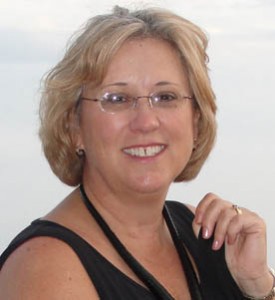 Lisa Coussens
Lisa CoussensDr. Coussens is Professor and Chair of the Cell & Developmental Biology Department and Associate Director for Basic Research in the Knight Cancer Institute at Oregon Health & Sciences University (OHSU), and holds the Hildegard Lamfrom chair in Basic Science. Dr. Coussens recently joined OHSU from the University of California, San Francisco where she was Professor of Pathology, Co-Leader of the Program in Cancer Immunity and Microenvironment, and Co-Director of the Mouse Pathology Shared Resource in the Helen Diller Family Comprehensive Cancer Center. Dr. Coussens’ laboratory is well known for their studies on immune cell regulation of angiogenesis and cancer and as such is highly experienced in employing animal models to assess tissue and organ function under homeostatic and pathophysiologic conditions. After receiving her BA at San Francisco State University, she went on to earn at PhD in biological chemistry at the University of California, Los Angeles. Dr. Coussens served as a professor in the department of pathology at UCSF until 2011 when she joined Oregon Health and Science University as Chair of the Department of Cell and Developmental Biology.
Her first lecture presented on Thursday April 25th 2013 was titled:
Inflammation and Cancer: New Targets for Anti-Cancer Therapy
In the past 30 years, a majority of cancer studies have focused on examining the functional consequences of activating and/or inactivating mutations in critical genes implicated in cell cycle control. These studies have taught us a great deal about the functions of oncogenes and tumor suppressor genes, and signaling pathways regulating cell proliferation and/or cell death. However, such studies have largely ignored the fact that cancers are heterogeneous cellular entities whose growth is dependent upon reciprocal interactions between genetically altered “initiated” cells and the dynamic microenvironment in which they live. This seminar will highlight aspects of solid tumor development now recognized as being regulated by recruited immune cells, and importantly, have led to identification of new immune-based targets for anti-cancer therapy.
Her second lecture presented on Friday April 26th 2013 was titled:
Inflammation and Cancer: Reprogramming the immune microenvironment as an anti-cancer therapeutic strategy
The concept that leukocytes are components of malignant tumors is not new; however, their functional involvement as promoting forces in tumor progression has only recently been appreciated. We are interested in understanding the molecular mechanisms that regulate leukocyte recruitment into neoplastic tissue, subsequent regulation those leukocytes exert on evolving cancer cells, and how malignant cells in turn respond to cytotoxic therapies. By studying transgenic mouse models of skin, lung, breast and pancreas cancer development, we have appreciated that adaptive leukocytes differentially regulate myeloid cell recruitment, activation, and behavior, by organ-dependent mechanisms. In turn, selective myeloid cell types provide key survival factors to malignant cells, foster angiogenic programs and invariably blunt CD8+ T cell-mediated killing of tumor cells. Treatment of transgenic mice predisposed to these various cancer types with agents that selectively block adaptive/myeloid-based programs results in slowing of primary tumor growth, improved responses to chemotherapeutic drugs, and significantly diminished presence of metastatic disease. To be presented will be recent insights into organ and tissue-specific regulation of epithelial cancer development by adaptive and innate immune cells, and new studies evaluating how attenuating protumor properties of myeloid cells can be exploited to enhance therapeutic responses to cytotoxic therapy.